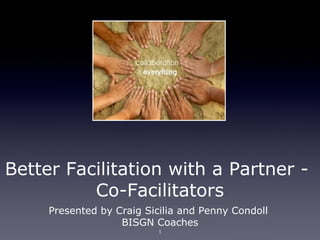
Co facilitator presentation
- 1. Better Facilitation with a Partner - Co-Facilitators Presented by Craig Sicilia and Penny Condoll BISGN Coaches 1
- 2. Penny Condoll Project Manager and Founder, BEST BISGN Coach Brain Injury Support Group Facilitator in Tacoma and Puyallup Craig Sicilia Director, TBI Support Network BISGN Coach Brain Injury Support Group Facilitator in Spokane Janet Novinger: BISGN Training Coordinator
- 3. Objectives • Understand the roles, skills and characteristics of a great facilitator • How to find a co-facilitator • Setting the stage for a successful relationship • Defining strengths and interests • Learn tips for Before, During and After the Meeting 3
- 4. Defining Facilitation A facilitator is someone who helps a group of people understand their common objectives and assists them to plan to achieve them without taking a particular position in the discussion. Wikipedia 4
- 5. Role of Facilitator (and Co-Facilitator) Facilitators provide the process to help a group: Discuss an issue Make a decision Solve a problem 5
- 6. Skills of an Effective Facilitator listens and observes designs or chooses appropriate group discussion techniques asks probing questions understands people and groups thinks quickly energizes group paraphrases and summarizes Uses humor successfully resolves conflict knows a variety of techniques for uses visual aids effectively group discussions, including problem-solving and decision-making acknowledges & responds to emotions 6
- 7. Characteristics of an Awesome Co-Facilitator 7
- 8. How to find the right co-facilitator • Evaluate the strengths and interests of your group members • Tell group your looking for help • Explain the benefits of being a facilitator • Let people try out a task before agreeing 8
- 9. Before the Meeting Schedule ample time for planning Take some time to get to know each other and discuss each other’s style of planning and facilitating Avoid making assumptions about one another Take time to discuss your views about topics, especially examine areas of disagreement Discuss any concerns about potential challenges that participants may present Agree on common goals Review each other’s triggers 9
- 10. Before the Meeting Find out whether and when it is okay to interrupt Decide how to keep track of time Strategize about how to stick to the original outline and how to switch gears Plan ways to give signals to one another Divide facilitation of activities fairly Share responsibility equally in preparing and bringing workshop materials and resources Agree to arrive in time to set up and check-in before the meeting begins Schedule time afterwards to debrief
- 11. During the Meeting Remember to keep a professional demeanor at all times Keep communicating with each other throughout the meeting Support and validate one another During activities that don’t require constant attention, check-in with one another Include your co-facilitator even when you are leading an exercise or discussion, by asking, for example: “Do you have anything to add?” Use lots of eye contact Assert yourself if your co-facilitator is talking too much Remember that it is okay to make mistakes Take the initiative to step in if your co-facilitator misses an opportunity to address a myth 11
- 12. After the Meeting If you can’t meet right after the meeting, schedule a time to debrief before you leave Listen carefully to one another’s self-evaluation before giving feedback Discuss what worked well and examine what did not work Brainstorm what could have been done differently Use written evaluations as a reference point to talk and assess your effectiveness as co-facilitators 12
- 13. After the Meeting Name particular behaviors, for example: “When you kept interrupting me, I felt undermined and frustrated”, or “I got the impression that some participants were bored”, instead of “You always interrupt me” or “You were very controlling during the workshop.” Realize the importance and potential difficulty of debriefing a challenging meeting Make sure to share any clean-up or return of resource materials
- 14. Closing Bow Thank you for all you do
